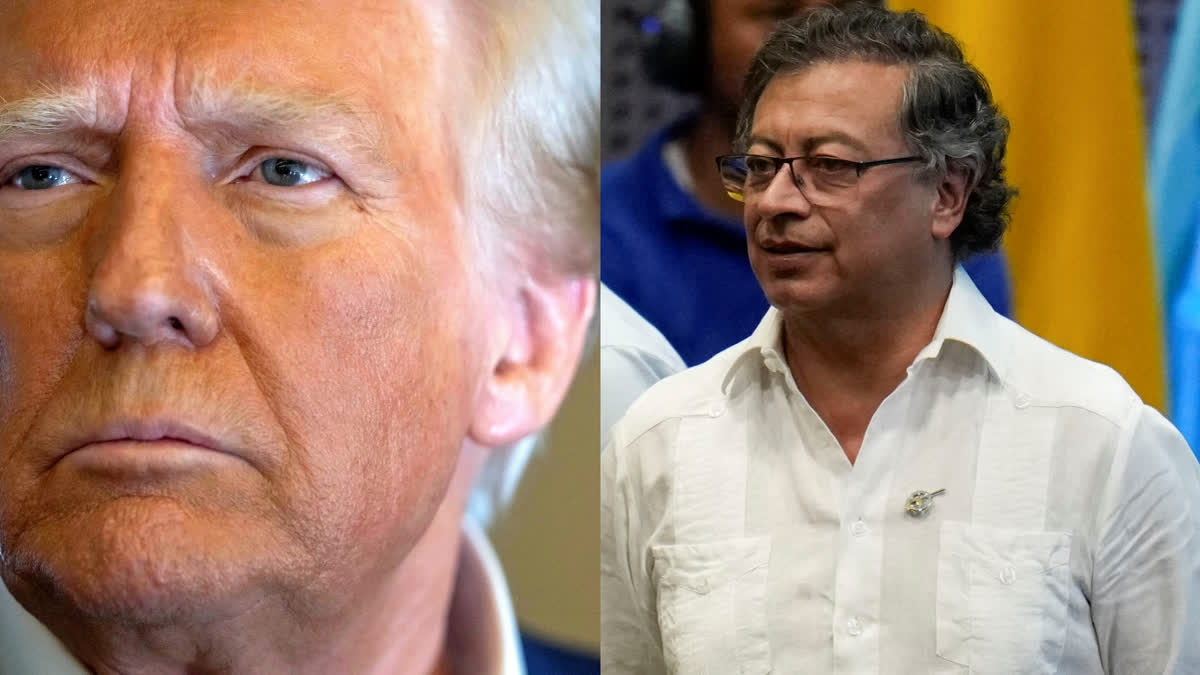Bogota: The United States and Colombia, long close partners in anti-narcotics efforts, clashed Sunday over the deportation of migrants and imposed tariffs on each other’s goods in a show of what countries could face if they intervene in the Trump administration’s crackdown on illegal immigration.
Presidents Donald Trump and Gustavo Petro, in a series of social media posts, defended their views on migration, with the latter accusing Trump of not treating immigrants with dignity during deportation and announcing a retaliatory 25% increase in Colombian tariffs on U.S. goods.
Earlier, the U.S. president had ordered visa restrictions, 25% tariffs on all Colombian incoming goods, which would be raised to 50% in one week, and other retaliatory measures sparked by Petro's decision to reject two Colombia-bound U.S. military aircraft carrying migrants.
Trump said the measures were necessary because Petro's decision “jeopardized” national security in the U.S. “These measures are just the beginning,” Trump wrote on his social media platform Truth Social. “We will not allow the Colombian Government to violate its legal obligations about the acceptance and return of the Criminals they forced into the United States.”
Earlier Sunday, Petro said his government would not accept flights carrying migrants deported from the U.S. until the Trump administration creates a protocol that treats them with “dignity.” Petro announced two X posts, one of which included a news video of migrants reportedly deported to Brazil walking on a tarmac with restraints on their hands and feet.
“A migrant is not a criminal and must be treated with the dignity that a human being deserves,” Petro said. “That is why I returned the U.S. military planes that were carrying Colombian migrants... In civilian planes, we will receive our fellow citizens without being treated like criminals."
After Trump's announcement, Petro posted that he had ordered the “foreign trade minister to raise import tariffs from the U.S. by 25%.” Colombia has traditionally been the U.S.’s top ally in Latin America. However, their relationship has been strained since Petro, a former guerrilla, became Colombia’s first leftist president in 2022 and sought distance from the U.S.
According to Witness at the Border, an advocacy group that tracks flight data, bia accepted 475 deportation flights from the U.S. from 2020 to 2024, fifth behind Guatemala, Honduras, Mexico and, and El Salvador accepted 124 deportation flights in 2024.
Colombia is also among the countries that last year began accepting U.S.-funded deportation flights from Panama. The U.S. government didn't immediately respond to a request for comment from The Associated Press regarding aircraft and protocols used in deportations to Colombia.
“This is a clear message we are sending that countries have an obligation to accept repatriation flights," a senior administration official told AP. The official spoke on the condition of anonymity because they were not authorized to discuss issue publicly.
U.S. Secretary of State Marco Rubio in a statement said Petro “canceled his authorization” for the flights when the aircraft were in the air. No official order had been issued as of Sunday afternoon that would allow for the implementation of the measures Trump announced.
A State Department spokesperson confirmed to AP the agency suspended processing visas at the U.S. Embassy in Colombia's capital, Bogota, “in direct response to President Petro’s decision to not accept repatriation flights of Colombian citizens.”
Colombians emerged in recent years as a major presence on the U.S. border with Mexico, aided in part by a visa regime that allows them to easily fly to Mexico and avoid trekking through the treacherous Darien Gap.
They ranked fourth with 127,604 arrests for illegal crossings during 12 months through September, behind Mexicans, Guatemalans and Venezuelans. Mexico hasn't imposed visa restrictions on Colombians, as they have on Venezuelans, Ecuadoreans and Peruvians.
Petro's government in a statement later announced that the South American country's presidential aircraft had been made available to facilitate the return of migrants who were to arrive hours earlier on the U.S. military airplanes and guarantee them “dignified conditions."
As part of a flurry of actions to make good on Trump's campaign promises to crack down on illegal immigration, his government is using active-duty military to help secure the border and carry out deportations. Two U.S. Air Force C-17 cargo planes carrying migrants removed from the U.S. touched down early Friday in Guatemala.
That same day, Honduras received two deportation flights carrying a total of 193 people. In announcing what he called “urgent and decisive retaliatory measures,” Trump explained that he ordered the tariffs and “A Travel Ban and immediate Visa Revocations” on Colombian government officials, allies and supporters.
“All Party Members, Family Members, and Supporters of the Colombian Government,” Trump wrote will be subject to “Visa Sanctions.” He did not say to which party he was referring or provide any additional details on the visa and travel restrictions.
Trump added that all Colombians will face enhanced customs inspections. Trump’s actions would seem to undercut his goal to reduce his country's trade deficit. Unlike Mexico or China, Colombia is one of the few countries with a trade deficit with the U.S., of around $1.4 billion, according to U.S. trade data.
Colombia is the U.S.’s second-biggest buyer of corn and corn feed, according to the U.S. Grains Council, helping boost U.S. commodity exports from farm belt states like Iowa, Indiana and Nebraska to more than $733 million last year.
The U.S. export boom has been driven by a two-decade-old free trade agreement between the two countries, which have for long been close partners in the war on drugs. It is unclear if Trump’s tariffs are allowed under the agreement, which contains a dispute mechanism to resolve trade fights.
Colombia is the U.S.’s fourth-largest overseas supplier of crude oil, shipping about 209,000 barrels of oil per day last year, although booming domestic production has reduced the U.S.’ dependence on foreign oil. The South American country is also the U.S.’s largest supplier of fresh-cut flowers.



